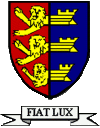by Terry Sutton
1931
Europe and America were in the throes of economic problems in December 1931 when the school buildings of Dover County School were officially opened and unemployment was soaring in Dover and East Kent.
In America there was a slump and the crash of Clarence Hatry in the City in 1929 was still sending its shock waves around the world.
Kent County Council and Dover Town Council had started a programme of work worth a total of £300,000 to provide jobs for the unemployed.
The construction of Dover County School for Boys at Astor Avenue, and the massive excavations necessary, was one of many schemes in hand before the government called for spending cuts.
Cross-channel traffic, in freight and passengers, slumped Europe went into recession.
This was the scenario against which the boys of the school, many on cycles, climbed the hill to see Prince George open the new building.
Some would have seen the unemployed hastily building the steps from Priory Gate Road to Priory Hill that would be needed by boys heading for the new school building. It was just another task provided for Dover’s unemployed.
Before they left home the boys would have heard their parents talking about the National Government formed by Conservatives and Liberals and of the election of Major Astor (Conservative) to Parliament for the Dover Constituency with a near 20,000 majority.
They would have heard of Southern Railway’s proposals to promote a Bill in Parliament to allow the construction of a train ferry dock at Dover and of the plans to construct an overhead haulage system from Tilmanstone Colliery to a coaling staith for ships on the Eastern Arm.
They might have seen a new French ferry just brought into service on the Calais to Dover service. Its name was the Cote d’Azur.
The town council at Dover had just reduced the local rate to 11s 7d in the pound; and councillors were joining in talk about opening a soup kitchen for the children of the unemployed.
Members of Dover Rotary Club were collecting money to buy boots for poor children.
But not all was gloom in 1931. At the Shakespeare Buffet in Dover’s Bench Street the Crypt Orchestra played each night, and the ravishing Marlene Dietrich was the star of a film at a Dover picture house where circle seats cost 6d.
Fireside chairs were on sale in shops for 21/-, dinner suits lined with art silk cost four guineas, oranges were a penny each, and mixed nuts 1/6d a gallon.
Kent that year beat Nottinghamshire at Crabble but the weather that summer was so bad that the second match, against Worcestershire, was rained off after 55 minutes.
The weather was so bad that only two tried to swim the English Channel and both failed.
Dover’s mayor, Councillor F. R. Powell, was calling on Dover citizens to help the unemployed by buying British.
In 1931 Lady Stamp presented the prizes to the boys of Dover County School. Her husband, chairman of the London, Midland and Scottish Railway told the boys they had a school of which they could be proud. And because they were such good chaps he got them a day’s holiday.
Meanwhile in Germany a man called Hitler was gaining power. Soon he would become a dictator . . . the war clouds were gathering over Europe. They would lead to a conflict that changed the social order of things, and some of the boys attending the opening ceremonies would die on the battle fields of World War Two.
1981
Fifty years later many of the world’s problems and events were repeating themselves.
The government, faced with economic problems, was trying to cut down expenditure. Once more the number of unemployed in Dover and district was increasing.
But this time the port of Dover, on which much of the economy of the district now depends, continued to boom with more traffic.
And the French brought in a new ferry – the Cote d’Azur – on the Calais to Dover service.
Many of the smaller shops that the boys of 1931 knew are now replaced by supermarkets. Chinese and Indian restaurants had succeeded many traditional shops.
And once again there were calls to “Buy British” to help the home economy.
